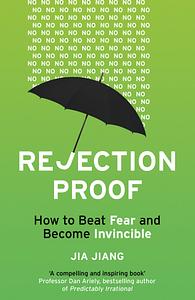Take a photo of a barcode or cover
This book provides actionable items to be more rejection proof. The stories Jia Jiang told to become rejection proof where also fun to read about.
Heard the author speak at a conference so purchased his book. Love the message and the videos are awesome. Krispy Kreme is the best. I disagree with the notion that effort trumps results, but align with the rest of the message. Great book.
informative
lighthearted
medium-paced
A misleading title - it’s not so much about protecting yourself from rejection or being less sensitive to it, so much as it’s about the phrase “don’t let others say no for you”. All in, I did still enjoy it, but it turned out to be a bit more salesy than I’d anticipated.
I read most of this and skimmed the rest (enough that I feel like I can review it). I agree with the premise of this book. We can learn a lot from rejection. I think, though, that the information here would fit better in a TED talk (which Jia gave) or a short article. It wasn't interesting enough for me to read every word.
That said, I was rejected pretty hard earlier this year (grad school) and this book helped me put that rejection into perspective. It certainly contains useful information.
One other random thought: I wonder if Jia Jiang went on a mission. It seems to me from his story that he is a Mormon, but a lot of the ideas he had about rejection were similar to those that I had on my mission while I was experiencing rejection daily, even hourly. I expect that there are many ways to gain these same insights.
That said, I was rejected pretty hard earlier this year (grad school) and this book helped me put that rejection into perspective. It certainly contains useful information.
One other random thought: I wonder if Jia Jiang went on a mission. It seems to me from his story that he is a Mormon, but a lot of the ideas he had about rejection were similar to those that I had on my mission while I was experiencing rejection daily, even hourly. I expect that there are many ways to gain these same insights.
funny
hopeful
informative
inspiring
lighthearted
reflective
medium-paced
The fascinating journey of an underconfident person who decided he needed to work on his ability to cope with rejection. Jiang had a prestigious, high paying job, and was living in the US, having handled the challenge of moving there alone as a student, so he didn’t lack discipline or courage, but knew that he could achieve more if he could get rid of the burden of fear he carried, which had stopped him from following his dream to be an entrepreneur.
On the birth of his first child, his wife freed him to follow that dream, giving himself 6 months. Toward the end of that time, his idea for an app was rejected by a sponsor and he knew that he needed to face his demons, and try to heal himself.
This is the story of the steps he took to desensitize himself to disappointment and embarrassment. It’s fascinating and cringeworthy and makes you squirm, the things he forced himself to undertake during his 100 days of rejection experiment, and this reality and personal journey makes the book as compelling as a novel. Jiang explains the basis of his success and original fears eloquently enough to make him a fascinating character in his own story, and he is sensitive and thoughtful enough about these hard challenges that he extracts lots of principles and wisdom from each one, originally recording them in a blog which eventually became virally successful. Almost distracted by offers of fame and money as a blogger, Jiang continued his project and eventually published his results in this fascinating book.
This work has plenty to offer for anyone who is sometimes lacking in confidence, who has feared failure to the point of self discouragement, or who is simply interested in learning to move beyond their fears and improve.
Jiang learns about how to phrase a request, the value of asking for feedback after disappointment, and lots more which he clearly distils at the end of a chapter into lists of advice, which is fantastic because you can see where the advice came from, and then he uses it in his next challenge.
This would be just the sort of book to give to somebody who has been discouraged, to help them to climb back up for another try, or to a young person just starting out with facing the world.
On the birth of his first child, his wife freed him to follow that dream, giving himself 6 months. Toward the end of that time, his idea for an app was rejected by a sponsor and he knew that he needed to face his demons, and try to heal himself.
This is the story of the steps he took to desensitize himself to disappointment and embarrassment. It’s fascinating and cringeworthy and makes you squirm, the things he forced himself to undertake during his 100 days of rejection experiment, and this reality and personal journey makes the book as compelling as a novel. Jiang explains the basis of his success and original fears eloquently enough to make him a fascinating character in his own story, and he is sensitive and thoughtful enough about these hard challenges that he extracts lots of principles and wisdom from each one, originally recording them in a blog which eventually became virally successful. Almost distracted by offers of fame and money as a blogger, Jiang continued his project and eventually published his results in this fascinating book.
This work has plenty to offer for anyone who is sometimes lacking in confidence, who has feared failure to the point of self discouragement, or who is simply interested in learning to move beyond their fears and improve.
Jiang learns about how to phrase a request, the value of asking for feedback after disappointment, and lots more which he clearly distils at the end of a chapter into lists of advice, which is fantastic because you can see where the advice came from, and then he uses it in his next challenge.
This would be just the sort of book to give to somebody who has been discouraged, to help them to climb back up for another try, or to a young person just starting out with facing the world.
I listened to it on Audible at first, but got so sick of the narration that I found it elsewhere and did a speed-read on the rest. I thought the writing style was not mature, and the author tended to dramatize events and make things more "exciting" and wordier than necessary. To be fair, I found the narration incredibly annoying, and that could have affected my perception of the entire book...
Overall, I connect a lot with this other review I read, especially:
"Rejection Proof is not a long book, but it left me with the feeling that it would have been better as a more concise feature in a magazine or blog. I was attracted to the book by the title and premise: author Jia Jiang's journey through seeking rejection every day for 100 days. It sounded like a quest that could turn up some revelations, or, at the very least, some entertaining stories--and indeed, there are some helpful perspectives and amusing anecdotes--but ultimately, they are stretched thin and lacking impact." - https://www.goodreads.com/review/show/1542198843
Kudos to Jia for putting himself out there, but it's difficult to imagine Jia writing this book in this same tone had he not gained fame and success through the popularity of his blog and methods. I personally think it would be way more compelling to read a story about someone who gained no attention or success from 100 days of rejection, yet still found the experience powerful. Reading/listening to the Rejection Proof kind of gives me the feeling that Jia writes this with "rose-tinted glasses" or some sort of success bias?
Overall, I connect a lot with this other review I read, especially:
"Rejection Proof is not a long book, but it left me with the feeling that it would have been better as a more concise feature in a magazine or blog. I was attracted to the book by the title and premise: author Jia Jiang's journey through seeking rejection every day for 100 days. It sounded like a quest that could turn up some revelations, or, at the very least, some entertaining stories--and indeed, there are some helpful perspectives and amusing anecdotes--but ultimately, they are stretched thin and lacking impact." - https://www.goodreads.com/review/show/1542198843
Kudos to Jia for putting himself out there, but it's difficult to imagine Jia writing this book in this same tone had he not gained fame and success through the popularity of his blog and methods. I personally think it would be way more compelling to read a story about someone who gained no attention or success from 100 days of rejection, yet still found the experience powerful. Reading/listening to the Rejection Proof kind of gives me the feeling that Jia writes this with "rose-tinted glasses" or some sort of success bias?
Lots of insights from his experience with 100 rejections in this easy read, which made me realize how freeing it is to make peace with - and even embrace - rejection.
Worth the read. :)
Worth the read. :)




